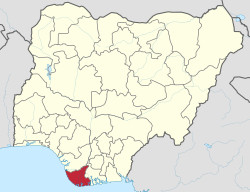INTRODUCTION
Bayelsa is one of the six states that make up Nigeria's South-South geopolitical zone. It has interstate boundaries with Rivers State to the West and Northwest and Delta State to the East and Southeast. The Gulf of Guinea lies to its South. The capital is Yenagoa.
LANDMASS, LOCATION AND POPULATION
Bayelsa State covers an area of 21,108.4 square kilometres. It lies at latitude 4°45' North and longitude 6°05' East. It has a population of 1,704,515 (2006 census) 2,277,961 (2016 forecast) with a population density of 209. The accounts for 1.21% of Nigeria's total population.
HISTORY AND PEOPLE
The early settlers of Bayelsa State were the Ijaw people. The state derives its name from acronym of three of its main local government areas - Brass (BALGA), Yenagoa (YELGA) and Sagbama (SALGA). Bayelsa State was originally part of the Eastern Region in the three-region structure of 1954. In 1967, with the creation of twelve federal states by General Yakubu Gowon's military government, it became part of Rivers State. In 1996, the military government of General Sani Abacha carved out a portion of Rivers State to create Bayelsa State.
The main ethnic groups in Bayelsa State are the Ijaw, Kolokunu, Ekpetiama, Igbriran, Atissa and Biseni. There are ten languages in the state, of these, Izon, Nembe, Ogbia and Epie-Atissa are the most predominant. Christianity is the dominant religion in Bayelsa State, although some groups practise traditional religion.
MAIN TOWNS AND CITIES
Yenagoa (capital), Amassoma, Brass, Ekeremor, Kaiama, Nembe, Odi, Ogbia, Oporama, Otuoke and Sagbama.
LOCAL GOVERNMENT AREAS
ADMINISTRATORS AND GOVERNORS
Phillip Ayeni (Administrator - Military): October 1996 - February 1997
Habu Daura (Administrator - Military): February 1997 - June 1997
Caleb Olubolade (Administrator - Military): June 1997 - July 1998
Paul Obi (Administrator - Military): July 1998 - May 1999
Diepreye Alamieyeseigha (Governor - Civilian (People's Democratic Party)): May 1999 - December 2005
Goodluck Jonathan (Governor - Civilian (People's Democratic Party)): December 2005 - May 2007
Timipre Sylva (Governor - Civilian (People's Democratic Party)): May 2007 - April 2008
Werinipre Seibarugo (Acting Governor - Civilian): April 2008 - May 2008
Timipre Sylva (Governor - Civilian (People's Democratic Party)): May 2008 - January 2012
Nestor Binabo (Acting Governor - Civilian (People's Democratic Party)): January 2012 - February 2012
Seriake Dickson (Governor - Civilian (People's Democratic Party)): February 2012 - February 2020
Douye Diri (Governor - Civilian (People's Democratic Party)): February 2020 - Present.
ECONOMY AND EDUCATION
Bayelsa State is predominantly tropical rainforest and mangrove swamps. Fishing is a major economic activity in the state. Agriculture is also important with yams, cassava, plantains, oil palms and bananas are the main crops. The state's inhabitants also participate in palm oil milling, lumbering, palm wine tapping, local gin making, trading, carving and weaving.
The most important mineral in Bayelsa State is petroleum. The state contributes about 40 percent of Nigeria's oil and gas production. Other minerals include natural gas, clay and industrial sand. The oil and gas industry is the state's major economic activity. The liquefied natural gas supply plant is located in Bayelsa. The Kolo Creek Gas Turbine Project owned by the state government supplies electricity to Yenagoa and surrounding towns and villages.
The major tertiary institutions in the state are Federal University, Otuoke; Niger Delta University, Amassoma; Niger Delta City Polytechnic, Ogbia; Federal Polytechnic of Technology, Ekowe; Bayelsa State College of Art and Science, Agudama-Epie; and Bayelsa State College of Health Technology, Ogbia.
FAMOUS SITES AND CULTURE
Sites
The Ox-Bow Lake, Yenagoa
The Ox-Bow Lake is sited in the heart of Yenagoa.
Akassa Wildlife Forest, Akassa
The Akassa Wildlife forest has a rich collection of wildlife including more than 60 species of bird. It is located in Akassa, Brass local government area and covers 7,200 hectares of land.
Oloibiri oil field, Oloibiri
This is where oil was first discovered in commercial quantity in Nigeria 66 years ago.
The onshore oil field is located in Ogbia local government area and covers 13.7 square kilometres.
Culture
The people of Amassoma in Southern Ijaw LGA are synonymous with the annual Seigbein fishing festival.
The festival is celebrated every May 27 and marked with dance performances by various groups in the area.
The people of Odi Community in Kolokuma/Opokuma LGA celebrate Odi Ogoriba festival while their neighbours in Nembe are known for the annual King Koko Day.
The Lake Efi fishing festival is a major cultural event among the people of Sabagreia in Kolokuma/Opokuma LGA.
NOTABLE INDIGENES
Maj. Isaac Boro (1938 -1968)
Gabriel Okara (1921 – 2019)
DID YOU KNOW
Oloibiri in the Ogbia LGA is the site of the first oil well drilled in Nigeria (in 1956).
BAYELSA STATE IN PICTURES

